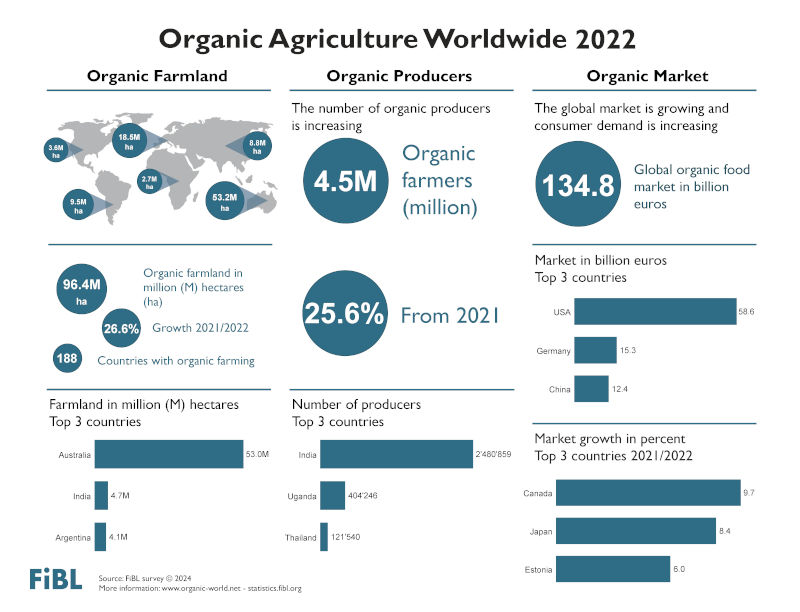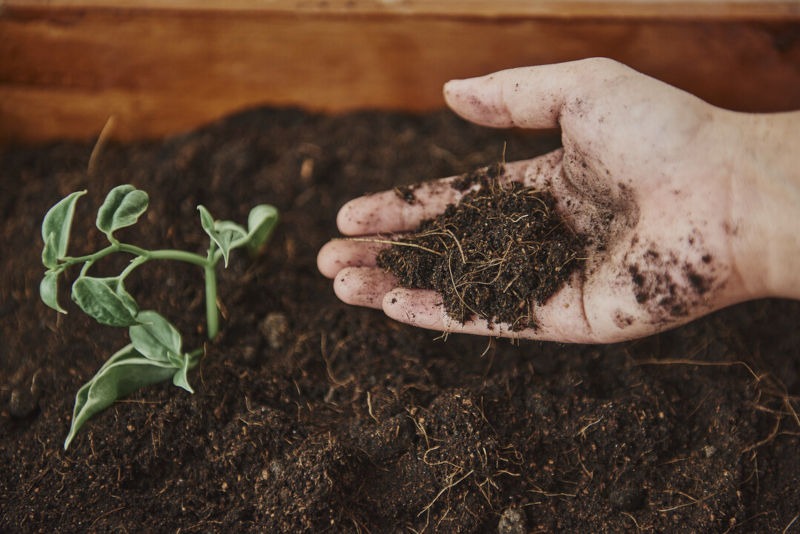
Richard Butler | Exclusive Report by FIBL NEWS | 13th FEB,2024
The global organic farming area increased by over 20 million hectares in 2022, reaching 96 million hectares. The number of organic producers also saw a significant rise, surpassing 4.5 million. The sales of organic food reached nearly 135 billion euros in 2022. The latest figures and the statistical yearbook “The World of Organic Agriculture”, which is being published for the 25th time this year, will be presented on Tuesday, February 13, 2024, from 3.45 to 4.45 pm (CET) at BIOFACH, the world’s leading trade fair for organic food in Nuremberg.
(Frick/Bonn, February 13, 2024) The 25th edition of the yearbook “The World of Organic Agriculture”, jointly published by FiBL and IFOAM – Organics International, shows that the growth in area and number of farms in 2022 far exceeded that of previous years, particularly due to increases in Australia and India. Data were provided by 188 countries.
The annual survey on global organic agriculture is supported by the Swiss State Secretariat for Economic Affairs (SECO), the Sustainability Fund of Coop Switzerland, and NürnbergMesse, the organiser of the BIOFACH trade fair.
Organic farming area increases significantly
By the end of 2022, 96.4 million hectares were under organic management, representing an increase of 26.6 percent or 20.3 million hectares compared to 2021. Australia showed tremendous growth (+17.3 million hectares) and remains the country with the largest area of organic agriculture at 53 million hectares, followed by India, the new number two (4.7 million hectares), where the area also increased significantly.
The organic farming area increased on all continents. Over half of the organic area is in Oceania (53.2 million hectares), followed by Europe with 18.5 million hectares and Latin America with 9.5 million hectares.
Leading the way: 22 countries manage ten percent or more of their agricultural land organically
In 2022, 2.0 percent of the world’s agricultural land was managed organically. However, many countries have much higher shares: Liechtenstein was at the top with 43.0 percent, followed by Austria (27.5 percent) and Estonia (23.4 percent). In 22 countries, 10 percent or more of the total agricultural land was managed organically.
4.5 million organic producers worldwide
In 2022, 4.5 million organic producers were reported, an increase of almost 26 percent, primarily due to a significant increase in India. India also remained the country with the most organic producers in 2022 (2.5 million producers).
Global organic market reaches nearly 135 billion euros
In 2022, the organic market reached nearly 135 billion euros. The United States continued to be the world’s leading market with 56.6 billion euros, followed by Germany (15.3 billion euros) and the new number 3: China (12.4 billion euros). While several countries in Europe experienced a decline, retail sales in Canada (+9.7 percent) and the United States (+4.4 percent) increased. The Swiss spent the most on organic food (an average of 437 euros per person), and Denmark continued to have the highest share of the organic market at 12 percent of the total food market.

Gaining momentum: 75 countries now have legislation on organic agriculture
The momentum of the organic sector is also evident in various activities to support organic agriculture. Many countries have launched action plans or other policy measures to promote organic farming. This positive trend is reflected in the increase in fully implemented national regulations for organic agriculture, which rose to a total of 75 in 2023.
Celebrating 25 years of the statistical yearbook “The World of Organic Agriculture”
“We are very pleased that, thanks to the great commitment of numerous supporters from all over the world, we can celebrate the 25th anniversary of the yearbook,” says Helga Willer from the Research Institute of Organic Agriculture FiBL, who has been responsible for the publication along with colleagues for 25 years.
For Jürn Sanders, Chairman of the Management Board of FiBL Switzerland, “The World of Organic Agriculture” is one of the most significant flagship projects of FiBL. “I take great pride in it,” he added.
“The statistics book measures the pulse of the organic sector and it is a key reference point for us when it comes to showcasing the impact and constant development of organic agriculture worldwide – it is an invaluable resource,” emphasizes Karen Mapusua, President of IFOAM – Organics International.
For Danila Brunner, Executive Director of BIOFACH, this publication is a must-read. “It provides well-founded facts and analyses, offering guidance and setting the course for the future!”





